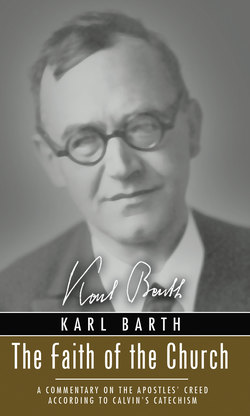Читать книгу The Faith of the Church - Karl Barth - Страница 9
На сайте Литреса книга снята с продажи.
ОглавлениеINTRODUCTION TO THE APOSTLES’ CREED
Questions 15–20
QUESTIONS 15–16. Now I would hear from you in a few words what the sum of this knowledge is.—It is contained in the confession of faith, or rather in the formula of confession, which all Christians hold in common. It is commonly called the Apostles’ Creed, because from the beginning of the Church it was always received among all the pious, and because either it came from the lips of the apostles or was faithfully collected from their writings.
Repeat it.—I believe in God the Father Almighty, Maker of heaven and earth; and in Jesus Christ His only Son our Lord, who was conceived by the Holy Ghost, born of the Virgin Mary, suffered under Pontius Pilate, was crucified, dead and buried; He descended into hell; the third day he rose again from the dead, he ascended into heaven, and sitteth on the right hand of God the Father Almighty; from thence he shall come to judge the quick and the dead. I believe in the Holy Ghost; the Holy Catholic Church; the communion of saints; the forgiveness of sins; the resurrection of the body; and the life everlasting. Amen.
The substance of this knowledge is the Creed in its entirety. Therefore the whole Creed refers to our knowledge of God in Jesus Christ. Jesus Christ does not appear “in the second act” only. He is unceasingly present, unceasingly active.
QUESTIONS 17–18. To understand the several points more thoroughly—into how many parts shall we divide this Confession?—Into four principal parts.
Name them to me.—The first refers to God the Father; the second concerns His Son Jesus Christ, and also includes the entire sum of man’s redemption. The third part concerns the Holy Spirit; the fourth the Church and the divine benefits vouchsafed to it.
I do not wish to insist on the question of the division of the Creed. Calvin—following the example of medieval scholasticism—counts four articles. Sometimes, however, only three articles were counted, integrating the Church and following affirmations under the third, that of the Holy Spirit.
QUESTIONS 19–20. Since there is no God but one, why do you here mention three, Father, Son and Holy Spirit?—Because in the one essence of God it is proper to regard God as beginning and origin, the first cause of all things; then the Son, who is his eternal wisdom; and last the Holy Spirit, as his virtue diffused through all things, which yet perpetually resides in himself. You mean that there is no absurdity if in one divinity we affirm these three persons, and that God is not thereby divided?—Just so.
Nor will I insist on the doctrine of the Trinity. Let us make only this remark: up to this point, Calvin has made no attempt to say what God is. No sooner is he forced to do so than he immediately speaks of the trinitarian God. Hence he does not give any general doctrine of God. Later on, in the seventeenth century, theologians begin with a general theory of the divine essence (independence, wisdom, etc.). But for Calvin, none of the qualities of God can be named outside the framework of the trinitarian God. You perhaps remember that in the years 1536–38 Calvin was attacked as an antitrinitarian by M. Caroli, who besides was crazy.… Calvin was not antitrinitarian, yet we cannot be satisfied with his declarations on the Trinity in his Catechism and in the Institutes. We cannot, as Calvin does, portion out the qualities of God upon three persons: God the Father as the origin, the Son as wisdom, and the Holy Spirit as God’s virtue. The persons in the Trinity are more than qualities in the Godhead. Calvin was suspected of adhering to the movement which confuses the three persons. Frankly, on this whole subject, I refer you to the first volume of my Dogmatics.
